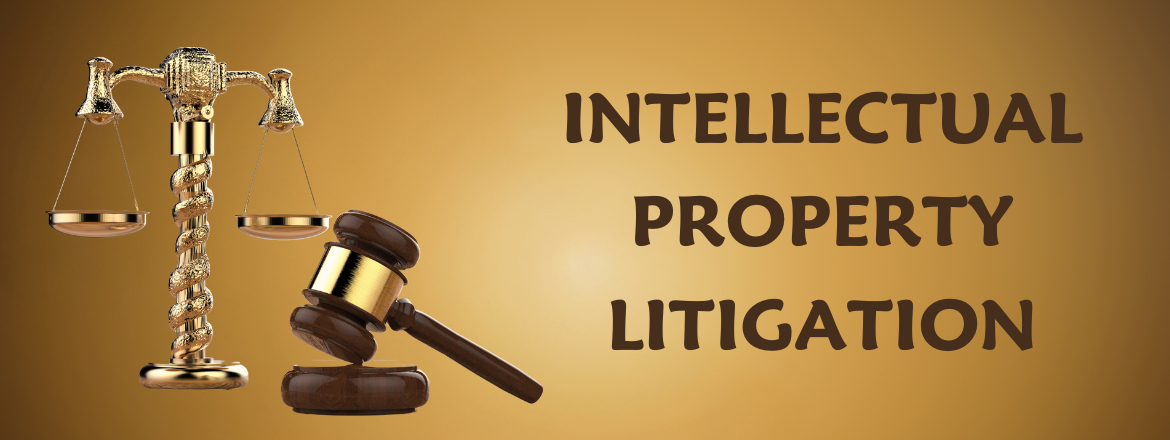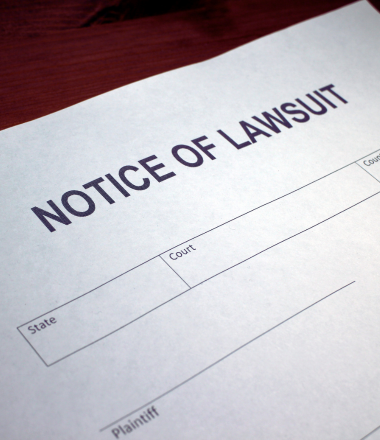A Guide to Intellectual Property Litigation

Table of Contents
Intellectual Property Litigation - Introduction
As a business owner, you know your intellectual property is a vital asset. From trademarks and patents to copyrights and trade secrets, your IP protects your innovations and branding. But when another company or individual infringes on those rights, intellectual property arbitration or litigation may be necessary depending on the severity of the case. This guide will walk you through the key aspects of pursuing or defending an intellectual property lawsuit. You’ll learn the basics of IP law, how to build a strong case, strategies for settlement versus trial, typical remedies and damages, and what to expect through each phase of the intellectual property litigation process. With the right information and preparation, you can make informed decisions to enforce your intellectual property rights. Let’s begin.
What is Intellectual Property Litigation?
Intellectual property litigation refers to the legal proceedings related to disputes over intellectual property rights, such as patents, trademarks, copyrights, and trade secrets. When a company believes that its intellectual property rights have been infringed upon, it may file a lawsuit against the infringing party. Conversely, a company may find itself the target of litigation if another party accuses it of intellectual property rights infringement.
Patent Litigation
Patent litigation involves lawsuits over the unauthorized use of patented inventions or processes. If a company's patented technology has been copied or stolen, it may sue the infringing party to stop the infringement and recover damages. Patent cases are often very complex, involving competing claims over prior art and the scope of the patents in question.
Trademark Litigation
Trademark litigation arises when a trademark owner believes that another party is using a confusingly similar mark that is likely to deceive or mislead consumers. The goal is to stop the infringing use and claim exclusive rights to the mark. Trademark cases typically revolve around determining whether there is a likelihood of confusion between the marks in the minds of customers.
Copyright Litigation
Copyright litigation deals with unauthorized copying, distribution or public display of creative works like books, songs, movies, software, etc. A copyright holder can file a lawsuit to stop the infringing activity and claim statutory damages. The key issue in copyright cases is whether the work in question is substantially similar to the copyrighted material and whether its use qualifies as fair use.
When to Pursue IP Litigation
IP Litigation can be expensive due to various factors such as legal fees, court costs, expert witness fees, and potential damages, or settlements. The complexity of the case, the duration of litigation, and the need for specialized expertise can further contribute to the overall cost. Thus, it is advisable to resort to IP Litigation for the following reasons.
If Your Rights Have Been Infringed Upon
If you believe a third party has infringed upon your intellectual property rights by using, making, or selling your invention, design, brand, or creative work without authorization, pursuing litigation may be necessary to enforce your rights. Legal action can prevent further infringement and allow you to recover damages.
If Licensing or Settlement Negotiations Have Failed
If you have attempted to license your intellectual property to a third party or settle an infringement dispute but have been unable to come to an agreement, litigation may be the only option left to resolve the issue. Lawsuits can force parties into settlement discussions and push them to agree to licensing or other terms.
To Establish a Legal Precedent
In some cases, intellectual property owners may pursue litigation not just for damages or to stop ongoing infringement but also to establish a legal precedent. A favorable court ruling can strengthen a patent, trademark or copyright and make future enforcement easier. It also deters others from infringement, knowing that the intellectual property in question has been upheld in court.
To Recover Monetary Damages
If a third party has profited from infringing your intellectual property rights, filing a lawsuit may allow you to recover a portion of those profits as well as other damages. The specific types and amounts of damages will depend on the nature of the intellectual property and details of the infringement. Recovering damages not only compensates you for your losses but also makes the infringing party pay for their unlawful behavior.
In summary, there are several situations in which pursuing intellectual property litigation may be advisable or even necessary. However, litigation can be extremely expensive, time-consuming, and risky, so the potential benefits and likelihood of success should always be carefully evaluated before moving forward with legal action.
The IP Litigation Process Explained
Here we will explore the key stages and consideration involved in the intellectual property litigation process.
- Initiate a Lawsuit
To begin intellectual property litigation, you must file a complaint in federal court alleging infringement of your IP rights. The complaint should identify the IP at issue, such as a patent or trademark, and explain how the defendant has infringed upon your rights. The defendant will then have the opportunity to file an answer responding to your allegations. - Discovery
After the initial pleadings, the parties engage in discovery. This includes exchanging documents related to the claims and defenses, answering written questions (known as interrogatories), and depositions, which are sworn, transcribed interviews of individuals with knowledge of the facts. Discovery allows the parties to gain evidence to support their positions. - Dispositive Motions
Before trial, the parties may file dispositive motions seeking judgment in their favor. For example, a motion for summary judgment argues that based on the undisputed facts, the movant is entitled to judgment as a matter of law. If granted, summary judgment will end the case without a trial. Motions to dismiss may also be filed, arguing that the complaint fails to state a viable claim. - Trial
If the case is not dismissed or resolved on summary judgment, it proceeds to trial. A jury trial is available for most IP claims. After the presentation of evidence by both sides, the jury deliberates and returns a verdict in favor of either the plaintiff or the defendant. Post-trial motions may be filed to challenge the verdict or request a new trial. - Appeals
The losing party has the right to appeal the final judgment to the Court of Appeals for the Federal Circuit, which has nationwide jurisdiction over IP appeals. The Federal Circuit reviews the trial record to determine if prejudicial legal errors occurred. If so, the court may reverse the judgment or order a new trial. The U.S. Supreme Court has discretion to review Federal Circuit decisions. Appeals can delay final resolution of a case by a year or more.
In summary, IP litigation follows the general steps of most civil lawsuits but has unique features derived from the federal laws governing intellectual property. With strong claims and effective advocacy, rights holders can obtain remedies including injunctions, damages, and attorneys' fees. However, litigation is complex, lengthy, and expensive. Many IP disputes settle before trial to avoid these costs and risks.


Strategies for Successful IP Litigation
To achieve a favorable outcome in intellectual property litigation, certain prudent strategies should be employed. It is important to conduct extensive research on the relevant IP laws and past case precedents that could influence your case. Thoroughly analyze your claim of infringement to build a robust argument supported by evidence.
- File the Lawsuit Strategically
Consider the venue and timing to file your lawsuit for maximum effectiveness. Analyze whether certain venues have a history of favoring IP holders to strengthen your position. Timing the filing to inflict the most harm on the infringing party, such as before the launch of their product, can provide leverage during settlement negotiations.
- Mount an Aggressive Defense
If defending against an IP lawsuit, take a vigorous stance to weaken the plaintiff's case. Challenge the validity and enforceability of their IP rights. Search for evidence of prior art that could invalidate their patent or trademark. Attack the evidence of infringement and propose alternative explanations to cast doubt. File counterclaims alleging unfair competition or IP misuse. An aggressive defense signals to the plaintiff your resolve to fight the lawsuit.
- Pursue Preliminary Injunctions
For IP holders, seek preliminary injunctions to halt the infringing acts during litigation. Stopping the production and sale of infringing goods or the use of infringing marks can prevent further damage. The plaintiff must show a likelihood of success on the merits of the case and irreparable harm if the injunction is not granted. Preliminary injunctions provide leverage to reach a settlement favorable to the IP holder.
- Settle Out of Court
While some IP disputes require a trial to resolve, most end in settlement. Settlement avoids the significant costs of litigation and the uncertainty of a trial verdict. Both parties have an incentive to settle, so explore options for compromise. Be willing to drop certain claims or reduce the amount of damages requested in exchange for the defendant ceasing their infringing acts. Settlement allows for creative solutions beyond what a court can order.
Advantages of IP Litigation
Following are few advantages to go for IP Litigation:
- Protecting Your Intellectual Property Rights
Litigation allows you to actively protect your intellectual property rights. By pursuing legal action against an infringing party, you can obtain remedies such as injunctions to stop ongoing infringement, damages to compensate for losses, and court orders requiring the destruction of infringing goods. This helps safeguard your IP rights and deters future infringement by others.
- Establishing a Legal Precedent
A successful litigation outcome can establish a legal precedent that strengthens your intellectual property rights. For example, if a court finds in your favor on the validity and enforceability of your patent, this makes it more difficult for others to challenge the patent in the future. The precedent from your case can be cited in subsequent litigation.
- Gaining a Strategic Advantage
Winning a high-profile IP litigation case against a key competitor can provide strategic benefits. It can damage their reputation, force them to stop selling infringing products, and allow you to gain market share at their expense. The publicity from major victories in court also enhances your reputation for aggressively defending your intellectual property.
In summary, intellectual property litigation provides significant advantages for rights holders to protect their IP, set legal precedents, gain strategic benefits over competitors, and enhance their reputation. While litigation does come with risks and costs, it remains an important tool for IP enforcement and strategy. With careful planning and execution, the rewards of successful litigation can be well worth the investment.
Disadvantages of IP Litigation
Following are the disadvantages of Litigation:
- Costs
Intellectual property litigation can be an expensive process. Legal fees, expert fees, and other litigation costs can amount to hundreds of thousands of dollars for even relatively straightforward cases. The complex nature of IP cases involving highly technical subject matter contributes to the high costs. If you lose the case, you may have to pay some of the other party’s fees as well.
- Time Consumption
IP litigation is also typically a lengthy process. Cases can take 2-5 years or more to make their way through discovery, pretrial motions, trial, and appeals. This long timeline requires an ongoing time commitment to meet with attorneys, review and respond to motions, sit for depositions, and possibly testify in court. For a small company, the time required can be a major burden.
- Uncertain Outcome
There is always a risk that you may not prevail in litigation, even if you believe you have a strong case. The inherent uncertainties of the litigation process, including the difficulties of predicting how judges and juries will view the evidence and apply the law, mean that the outcome is not guaranteed. Losing a case could mean losing important IP rights and competitive advantages. The possibility of an unfavorable outcome should be weighed carefully against the potential benefits of litigation.
- Damage to Business Relationships
Engaging in adversarial litigation against another party can often damage business relationships and create ill will. This is especially true if the other party is a competitor, customer, or supplier. While protecting your IP rights is important, litigation may not always be the best strategy and should be considered carefully based on your overall business interests. Alternative dispute resolution methods like mediation may be preferable in some situations.
Conclusion
In summary, intellectual property litigation can be a complex process that requires careful planning and execution. As the plaintiff, you must establish that your IP rights have been infringed upon and that you have suffered damages as a result. The defendant will aim to prove that no infringement occurred or that your IP rights are invalid.
Throughout the pre-trial and trial phases, you must build a persuasive case supported by concrete evidence of infringement and quantify the economic harm you have incurred. You should work closely with IP litigation counsel to determine the best legal strategies based on the facts of your specific case. While the litigation process can be lengthy and expensive, protecting your intellectual property rights is crucial to sustaining a competitive advantage and continued success in the marketplace.
With thorough preparation and the advice of experienced IP counsel, you can significantly improve your chances of a favorable outcome at trial. However, there is always a possibility of an unfavorable verdict. You should go into the litigation with reasonable expectations about potential outcomes and be prepared for either result. The key is to approach each stage of the process systematically, paying close attention to details and avoiding missteps that could weaken your case.
Facing intellectual property litigation? Let Abounaja Intellectual Property be your trusted partner. Our experienced team specializes in trademark, patent, copyright, and industrial design registration, as well as IP arbitration and litigation. With our comprehensive expertise and dedication to protecting your intellectual property rights, we'll navigate the complexities of litigation to ensure the best possible outcome for your business. Contact us today at [email protected] to learn how we can assist you in safeguarding your valuable intellectual assets.






